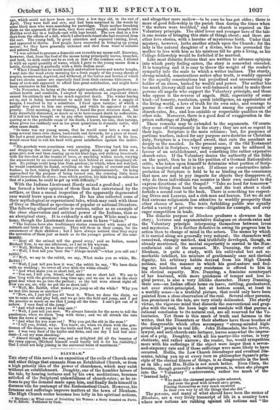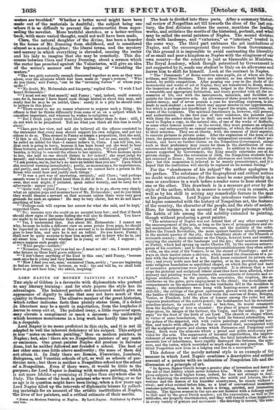BLENHAM..
Tam story of this novel is an exposition of the evils of Church-rates and other things that emanate from an Established Church, or from a high priestly idea of the power of churchmen, which may exist without an establishment. Doughty, one of the humbler heroes of the tale, by hearing lectures and by his own meditations, becomes satisfied of the Scriptural unlawfulness of church-rates • so he re- fuses to pay the demand made upon him, and finally findslimself in durance vile for contempt of the Ecclesiastical Court. However, his firmness and sufferings improve matters at the town of Blenham. The High Church rector becomes less lofty in his spiritual notions,
• Blenteim; or What came of Troubling the Waters: a Story founded on Facts. By. Elliott. Published by Cash.
and altogether more mellow—to be sure he has got older ; there is more of good fellowship in the parish than during the times when " the waters were troubled," anti the church is repaired on the Voluntary principle. The chief lover and younger hero of the tale is one means of bringing this state of things about ; and there are other love stories, with a heroine of mysterious birth. Under that mystery, however, lurks another attack upon the Church ; for the lady is the natural daughter of a divine, who has persuaded the mother to live with him as his mistress till he gets a living, as his College fellowship would be forfeited if he married.
Like most didactic fictions that are written to advance opinions into which party feeling enters, the story is somewhat onesided. It is tempting and it is easy to throw the weight of the reader's sympathy into the scale to which a writer inclines. The sturdy, strong-minded, conscientious seeker after truth, is readily opposed to the equally conscientious but prejudiced and unreasoning up- holder of an abuse, backed by wealth and power. The author has too much literary skill and too well-balanced a mind to make those persons all angelic who support the Voluntary principle, and those who oppose it the reverse of angels. Still, superiority of some kind—of honesty, resolution, quick intelligence, an appreciation of the living world, a love of truth for its own sake, and courage to pursue it—will more or less be found among the opponents of church-rates, &c., and less amiable or respectable qualities on the other side.' Moreover, there is a good deal of exaggeration in the prison sufferings of Doughty. These remarks may be extended to the arguments. Of course they come off triumphantly in the story ; they are not so cogent in their logic. Scripture is the main reliance ; but, for purposes of partisan warfare, indeed for any purpose save doctrine or Christian duty, Scripture is a two-edged sword, that cuts the assailant as deeply as the assailed. In the present ease, if the Old Testament included ncluded in Scripture, very many passages can be adduced in favour of an establishment, and something like rather expensive church-rates. If the Voluntary denies the authority of the Bible on the point, then he is in the position of a German Rationalistic critic, who takes upon himself to determine what portion of Scrip- ture is inspired and what is not. If silence or constructive inter- pretation of Scripture is held to be so binding on the conscience that men are not to pay imposts for objects they disapprove of, why do these individuals run counter in their own conduct to the express directions of the Gospel P "Take no heed for tomorrow" requires living from hand to mouth, and the text about a cloak forbids a second coat to the back. There is something too respect- ing Dives and Lazarus, and a rich man and heaven. Yet we do not find extreme religionists less attentive to worldly_ prosperity than other classes of men. The texts forbidding, public war equally forbid a variety of private for example, and, civefr i
eager competition n trade.
The didactic purpose of Blenham produces a slowness in the story ; lectures and argumentative dialogues on church-rates and the Voluntary principle interposing themselves between byes and mysteries. It is further defective in owing its progress leis to action than to change of mind in the actors. The scenes by which it is carried along are generally very natural ; the characters well conceived, strongly marked, :and,truthfullydeveloped, though, as
i
already mentioned, the mental superiority s carried to the Non- conformist side of the account.. .Mr. Dunning, the rector: of Blenham, is quite a study, with his cultivated but not re- markable intellect, his mixture of gentlemanly ease and clerical dignity, his arbitrary habits &rimed from his High Church notions, and the manner in which his good-nature and feel- ing are hardened when any resistance is offered to him in his clerical capacity. Mrs. Dunning, a feminine counterpart of her husband, with more quickness of temper and less lo- gical power, is also a very lifelike character. Henry Dunning, their son—an Indian officer home on leave, rattling, goodnatured, not over strict-principled, but at bottom sound, at least in a worldly sense—is a truthful picture, that could only have been painted from a close observation of the real. Several other persons, less prominent in the tale, are very nicely delineated. The sturdy virtue, the vigorous mind that discards the conventional and grap- ples with the real, the keen logic and resolute will that pursue a rational conclusion to its natural end, are all reserved for the Vo- luntaries. Yet there is this mark of truth and fairness in the writer, that the Dissenters or their abettors have those touches of the disagreeable which often accompany "strong-minded high- principled" people in real life. John Holmesdale, the hero, lover, lawyer, and anti-church-rate lecturer, leaves somewhat the impres- sion of a prig. Doughty, with all his martyr-like virtue, is very obstinate, and rather narrow the reader, too, would sympathize more with his sufferings if the object were larger than a seven- and-sixpenny rate and if those sufferings were more likely to have occurred. Hollis, the Low Church linendraper and eventual Die- senter, taking you up at every turn on philosopher Square's prin- ciple of the eternal fitness of things, is as disagreeable in the book as in i life • and Mrs. Hollis not much better. Even Clara, the heroine, though generally a charming person, is, when she plunges into the " Voluntary " controversies, rather too much of the "learned lady,"
"Who made the cleverest people quite ashamed, And even the good with inward envy groan, Finding themselves so very much exceedd. In their own way by all the things that she did." The persons, and many of what should have been the scenes of
Blenham, are a very lively transcript. of life in a country town where new notions are rubbing against old notions and "the waters are troubled." Whether a better -novel might have been made out of the materials is doubtful; the subject being one
'where it is so difficult to prevent the eontrovertist from supereding the novelist. More truthful sketches, or a better-written 'book, with more varied thought, could not well have been made.
Clara, the natural daughter of the divine, has been a boarder -in the house of Mr. Dunning from ehildirood, and is considered almost as a second daughter; the liberal terms, and the mystery
and secrecy in which everything is shrouded, causing the rector and his lady to imagine that she may be somebody. This dis- course between Clara and Fanny Dunning, about a sermon which the rector has preached against the Voluntaries, will give an idea of the writer's manner and the beginning of "troubling the 'waters."
"The two girls naturally enough discoursed together as soon as they were alone, over the allusions which had been made in 'papa's sermon.' 'Who ,da think,' said Fanny,'can be the "ravening wolves" of whom papa oo? '
No doubt, Mr. Holmesdale and his party,' replied Clara. 'I wish I had -beard Holmesdale!'
4'11 must not say that myself,' said Fanny ; 'and, indeed, could scarcely -tare for it, -because I have heard such things hinted at about this man, and zeally fear he may be an infidel, Clara : surely it is a pity he should come to lecture in this place.' "'There -seems to me no reason whatever to suppose such a thing : his dffeace is that he thinks differently from some of us on a subject which he -osneiders important, and whereon he wishes to enlighten us.' "But I think papa would most likely know better-than he does : still, I do not wish to be prejudiced. Tell me what you think all this fuss is really about.'
"Clara gave her view, and said she believed all the offence consisted in the statement that every-man should support his own religion, and not tax
others to do so. This-seemed to Fanny BO simple a proposition, that she said, If this is all, I think 'I should agree with him but no one, surely, would be called an infidel for that—I cannot believe it, Clara. I can tell you, too, .that cook is going to leave, because it has been found out she went to hear these lectures, and now will maintain that, as she says, "it's all gospel" ; and, besides, is trying to convert the others to her opinion. When mamma spoke
to her, she said no one should dictate to her indeed ! -she must judge for
herself; and when mamma said, "But the man is an infidel, cook," she replied, "I ask pardon, ma'm, but he's no more an infidel than you are." Upon which
she received warning immediately.; partly, as mamma says, for impertinence, and partly, and more particularly, because we cannot have a person in the house who could hear and justify such things.' "'It was a pert way of answering, certainly,' said Clara ; 'and perhaps .sounds worse to hear at third hand than it did at first. I can imagine, how- ever, that cook might, if irritated, speak rather warmly, and be sorry for it afterwards : cannot you ?'
"'Quite well,' replied Fanny; but that she is to go, shows very clearly what an opinion papa and mamma have of Mr. llolmesdale ; and do you think they would dismiss a servant on that account unless there were very good grounds for such an opinion'? He may be very clever, but we do not know anything of him.' '"Perhaps cook will express her sorrow for what she said, and be kept,' suggested Clara.
" No ; mamma says she could on no account keep her ; and that if Sarah should show signs of the same feeling she will also be dismissed. You know awe ought to be more particular than other people.'
"4 Yes, I understand that. But about Mr. Holmesdrde : I cannot see why, because beholds a different view on some points from papa, he should be regarded in such a light as that a servant is to be dismissed because she goes to hear him, and says he is not an infidel. Do you know, Fanny, I shall now be quite anxious to hear him myself, and to know who he is, and all about him. I wonder whether he is young or old old, I suppose ; I always suppose such people old.'
"'What people—infidels?' "'Nonsense, Fanny, you'reas bad as—Imust not say : no, I mean people who lecture on these hard grave subjects.' -" don't fancy anything of the kind in'this case,' said Fanny, because cook says he is young and very handsome.' "'Now I final you out, miss,' exclaimed Clara, archly ; you are beginning to feelain interest in the lecturer, as well : the end will be, we shall both have to go and hear him,' she added, laughing."



























 Previous page
Previous page